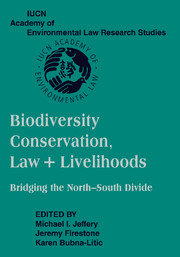 Biodiversity Conservation, Law and Livelihoods: Bridging the North-South Divide
Biodiversity Conservation, Law and Livelihoods: Bridging the North-South Divide Book contents
- Frontmatter
- Contents
- Acknowledgments
- Message from Kofi A. Annan, Secretary-General of the United Nations
- Macquarie Statement
- Contributors
- Introduction
- PART ONE THE CONTEXT
- PART TWO BIODIVERSITY: ITS CONSERVATION
- PART THREE CONSERVATION MEASURES
- PART FOUR USES OF COMPONENTS OF BIODIVERSITY
- 17 Legal Framework for the Ecological and Biodiversity Needs of Soil: Progress towards an International Instrument for the Sustainable Use of Soil
- 18 The Ghanaian Forestry Regime: Bridging the Gap between the North and the South
- 19 Bridging the Dominant-Indigenous Peoples Cultural Divide: Reflections on Makah Whaling
- PART FIVE PROCESSES AFFECTING BIODIVERSITY
- PART SIX BIOSECURITY ISSUES
- PART SEVEN ACCESS AND BENEFIT-SHARING
- Index
18 - The Ghanaian Forestry Regime: Bridging the Gap between the North and the South
Published online by Cambridge University Press: 31 July 2009
- Frontmatter
- Contents
- Acknowledgments
- Message from Kofi A. Annan, Secretary-General of the United Nations
- Macquarie Statement
- Contributors
- Introduction
- PART ONE THE CONTEXT
- PART TWO BIODIVERSITY: ITS CONSERVATION
- PART THREE CONSERVATION MEASURES
- PART FOUR USES OF COMPONENTS OF BIODIVERSITY
- 17 Legal Framework for the Ecological and Biodiversity Needs of Soil: Progress towards an International Instrument for the Sustainable Use of Soil
- 18 The Ghanaian Forestry Regime: Bridging the Gap between the North and the South
- 19 Bridging the Dominant-Indigenous Peoples Cultural Divide: Reflections on Makah Whaling
- PART FIVE PROCESSES AFFECTING BIODIVERSITY
- PART SIX BIOSECURITY ISSUES
- PART SEVEN ACCESS AND BENEFIT-SHARING
- Index
Summary
INTRODUCTION
The importance of forests as sources of food, medicine, habitats, and sinks, inter alia, cannot be overemphasized: humankind's very existence relies on the continued existence of these vital natural resources. This can be summed up in the adage, “When the last tree dies, the last man dies.” Indeed, the phenomenon of climate change has been declared a common concern of humankind; and forests as sinks for carbon have been identified as one of the major means for dealing with the phenomenon. Hence, the existence of forests anywhere in the world must be of concern to the entire global community.
In Ghana, the forestry sector contributes almost 6 percent of the country's Gross Domestic Product (GDP), with the timber industry providing direct employment to over 100,00 people and indirect employment to over 2.5 million others. Wood fuel accounts for 75 percent of Ghanaian domestic and industrial energy sources estimated at $USD200 million per annum. Hunting and the trade in bush meat also account for between $USD270 and $USD350 million annually. Nontimber forest products also contribute to the daily livelihood of forest fringe communities and the national economy by creating employment for a substantial number of people and by generating an annual amount of $USD250 million. The sector is also the backbone of the country's mainly nature-based tourism industry. Because of well-funded protected areas and the diversity of these nature-based attractions, this sector has become the number three foreign exchange earner for Ghana.
- Type
- Chapter
- Information
- Biodiversity Conservation, Law and Livelihoods: Bridging the North-South DivideIUCN Academy of Environmental Law Research Studies, pp. 347 - 357Publisher: Cambridge University PressPrint publication year: 2008


